Hopefully in the future realms of time, if my plans work out which they are often unlikely to do, this won’t be noticeable as the blog post that ‘brought Savidge Reads back’ after some time away. Yet when I was thinking about which book I should ‘come back’ with it seemed Gail Honeyman’s Eleanor Oliphant is Completely Fine was the most apt as it is the book I have talked about the most in a literal sense in the last year or so. The reason for that being that is was the winner of the category (debuts) I judged for last year’s Costa Awards. It is the book that I have had some of the most heated conversations about, not with my fellow judges (Sandy and Sophie who were both a joy) though we talked about it at length, with people in my day to day life who felt very strongly one way or the other and were surprised when it won. I wasn’t surprised. No, not because I knew in advance, ha, but because I think it is a book that can appeal to anyone and does a huge variety of things, with so many layers, and remains wonderfully readable – a word which can open a huge can of worms but I am not literary snob and embrace the joys of readability. Anyway, the book…
When people ask me what I do – taxi drivers, hairdressers – I tell them I work in an office. In almost eight years, no one’s ever asked me what kind of office, or what sort of job I do there. I can’t decide whether that’s because I fit perfectly with their idea of what an office worker looks like, or whether it’s just that people hear the phrase work in an office and automatically fill in the blanks themselves – lady doing photocopying, man tapping at keyboard. I’m not complaining. I’m delighted that I don’t have to get into the fascinating intricacies of accounts receivable with them.
And so we are thrown into the life of Eleanor Oliphant a woman whom to many would seem in the centre of society, with a decent job her own home etc, but who actually has become someone much more on the periphery of society that the facade of a ‘steady life’ would let on. She does her nine to five, Monday to Friday, and at the end of the latter she buys herself a few margarita pizzas and a couple of bottles of vodka and drinks the weekend away. It is here that the novel then takes two paths, though with many layers. Firstly we wonder why it is that Eleanor has found herself in this position and secondly we wonder how this cycle might be broken.
It is the latter that unfolds itself first. Walking home with a colleague Ray, who seems to want to befriend Eleanor much to her confusion, they witness an elderly man collapse and in helping him become embroiled further with each other and Sammy. A turning point in Eleanor’s life has come, even if she doesn’t really see it as an opportunity she particularly wants, the question is how she will deal with it? Especially when she has recently become besotted with a local pop star who she thinks she is destined to marry.
As to why Eleanor has ended up so isolated and alone, Honeyman does something which I really admired – if admittedly it does go a little twist-tatsic (I might trademark that) towards the end. We get a slow reveal which is at once heartbreaking but also eye opening. It is hard to say anything for fear of spoilers but there is some serious trauma in her past which we are slowly alluded to. For me the most heartbreaking moments were much more subtle, and this is what I hope to see lots more of in Honeyman’s writing in the future, where a single paragraph says so much within its subtext and the reader can start to fill in the blanks to much emotional effect.
She came with me from my childhood bedroom, survived the rough treatment in foster placements and children’s homes and, like me, she’s still here. I’ve looked after her, tended to her, picked her up and repotted her when she was dropped or thrown. She likes the light, and she’s thirsty. Apart from that, she requires minimal care and attention, and largely looks after herself. I talk to her sometimes, I’m not ashamed to admit it. When the silence and aloneness press down and around me, crushing me, carving through me like ice, I need to speak aloud, if only for proof of life.
That makes this novel sound like it is a misery feast and that is not the case at all, often I found myself chuckling along as I read. (I have said many a time on this blog in the past that a good dose of comedy can make the darker parts of a book all the more so.) As Eleanor reluctantly forces herself out into the world more and more the deadpan comedy comes in many high street spaces such as her first visit for a wax. ‘Hollywood’, I said, finally. ‘Holly would, and so would Eleanor’. Yet, again, here Honeyman does something which I think is very clever, she occasionally blurs the lines between when we are laughing with and laughing at Eleanor. A short sharp shock every now and again that we are doing exactly what those horrid co-workers are doing we dislike so much at the start. This isn’t intended as judgement, it is simply a reminder to check ourselves once in a while, to be kinder.
That said Eleanor is not always particularly kind herself. But her flaws and quirks are what make her such an interesting character. Her directness often made me ponder if we are meant to assume that she is on the autistic scale, though sometimes she is just simply rude to people. This is a woman though who has been so much on the sidelines of the world that everything seems as at odds with her as she as with it. It also reminds us that not everyone is instantly loveable but they are always relatable and there is almost always, if we make the effort to look and don’t expect everyone to come to us, an ‘in’ to their world.
When Raymond returned, I paid for lunch, since he had paid last time; I was really starting to get the hang of the concept of a payment schedule. He insisted on leaving the tip, however. Five pounds! All the man had done was carry our food from the kitchen to the table, a job for which he was already being recompensed by the cafe owner. Raymond was reckless and profligate – no wonder he couldn’t afford proper shoes or an iron.
Eleanor Oliphant is Completely Fine is very much like its central character; quirky, funny, frank and honest. Once you look past that facade it is also brimming with layers about being different but not being obviously or any stereotype of different. It is a blunt, yet digestible which is not always easy, look at the awful nature of loneliness and how easy it can be to become a loner. It is also about hope and a reminder that we should never judge anyone by any assumptions we might make of them. I applaud it for all of these things.


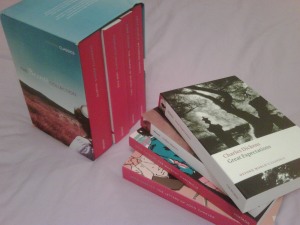
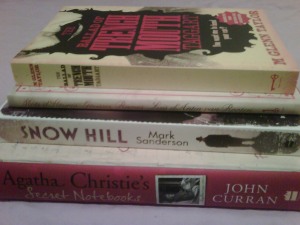
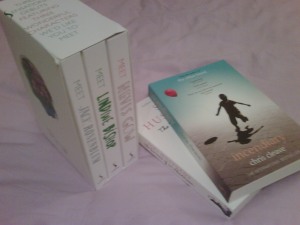
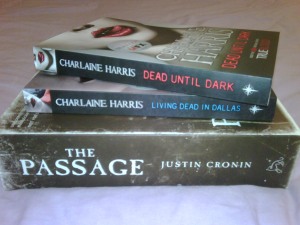
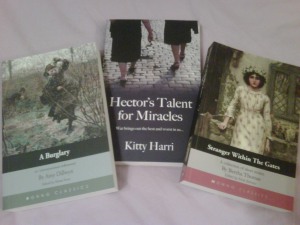
 The title ‘The Body in the Library’ kind of gives away just what is coming in the opening pages. Yes that’s right, the Bantry household awakes to find that there is indeed a body of an unknown platinum blonde in their library. No one in the household has seen the young girl before and it takes some time for the police to track her down. However it doesn’t take that long for Miss Jane Marple to appear on the scene as Mrs Bantry, a close friend, sends a chauffeur round for her pronto phoning ahead before ‘the recognised time to make friendly calls to neighbours’.
The title ‘The Body in the Library’ kind of gives away just what is coming in the opening pages. Yes that’s right, the Bantry household awakes to find that there is indeed a body of an unknown platinum blonde in their library. No one in the household has seen the young girl before and it takes some time for the police to track her down. However it doesn’t take that long for Miss Jane Marple to appear on the scene as Mrs Bantry, a close friend, sends a chauffeur round for her pronto phoning ahead before ‘the recognised time to make friendly calls to neighbours’. Miss Garnet’s Angel firstly it should be said is utterly wonderful. For me it had a real mixture of the quirky heroine of a 1930’s – 1950’s book you would think Virago would have published (they don’t publish this book) and also has the setting and prose of a classic that E.M. Forster could have penned, a combination which makes it highly and delightfully readable. I think all of this contributed to it being an utter hit with me.
Miss Garnet’s Angel firstly it should be said is utterly wonderful. For me it had a real mixture of the quirky heroine of a 1930’s – 1950’s book you would think Virago would have published (they don’t publish this book) and also has the setting and prose of a classic that E.M. Forster could have penned, a combination which makes it highly and delightfully readable. I think all of this contributed to it being an utter hit with me.










